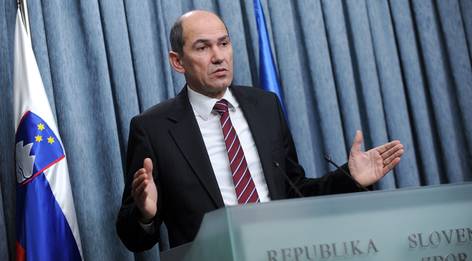NEWS
Prime Minister Janez Janša: Vote on the golden fiscal rule – a test without precedence in Slovenian parliamentarism
The Primer Minister of the Republic of Slovenia, Janez Janša, appeared yesterday evening in the Info TV show 'Hot seat', where he pointed out that the introduction of the golden fiscal rule into the constitution would considerably improve Slovenia's fiscal position on the international markets. "There is no other single measure that could to a greater extent improve Slovenia's financial standing on the international markets." He went on to say that the Government and the coalition parties assumed full responsibility within their powers and clout, but since the coalition did not enjoy a two-thirds majority in the National Assembly, all parliamentary parties had to assume responsibility for the outcome of the vote on the introduction of the golden fiscal rule into the constitution. "The voting records will show who can put his money where his mouth is and actually honour the constitutional oath by acting for a prosperous Slovenia. A test without precedence in Slovenian parliamentarism," the Prime Minister said.
When asked about the situation in the Slovenian banking sector and the figures for the alleged bad debts of Nova Ljubljanska banka (NLB), Mr Janša did not want to speculate on any specific numbers and assessed the state-of-play as being somewhat better than the rumoured six or eight billion. At its today's session, the Government will be briefed on the situation in the NLB but with respect to the other two banks with a majority stake of the state, and other banks "we can only guess from sparse information provided by the Bank of Slovenia". Information about one bank does not constitute a credible basis for a comprehensive assessment. As long as the situation is not known, investors do not and will not queue to buy our national silverware.
The Prime Minister also commented on the proposed establishment of a Slovenian sovereign holding to be voted on by the parliament next week. The results of this vote will, in his opinion, send a strong signal to the NLB's potential partners. "If the proposed act is adopted, potential partners will be willing to start preliminary discussions, otherwise, of course, not." Slovenian tax payers' money will also be protected through the establishment of this holding and the ensuing work of its personnel. "We, nevertheless, need a realistic picture of the situation, and only then we can start looking for solutions," the Prime Minister said. The purpose of the state-run holding is to finance the pension fund and thus alleviate the burden placed on the salaries and the budget. "In the light of this, the pensioners will through the holding strengthen the capital of the pension fund."
As to the public outcry over the reduction of pensions under the Fiscal Balance Act, the Prime Minister replied that the Act did not interfere with pensions and contributions paid to the pension fund but only with the recreation allowance and benefits financed by the budget which, due to a variety of benefits, can be classified into 53 different categories. He added that the legislator tried to find best possible equitable solution due to restrictions. "Whenever this measure resulted in a pension that was below the average pension or below the average pension amount, it was not applied" said the Prime Minister. He also stressed that the Government was preparing an analysis of the effects of this measure in comparison with the established system, and that the Pension and Disability Insurance Institute of the Republic of Slovenia would be asked to analyse the complaints in order to propose adjustments for cases in which discrepancies were identified. Prime Minister Janša continued by recalling the abolition of farmers' pensions during the previous government's term, which affected 15 000 farmers but "there was no row kicked up".
During the interview, Prime Minister Janša pointed out the fact that Slovenia had been overborrowing during the past three years and that budget spending for the period 2013-2104 should be slashed further and that more restrictive austerity measures should be imposed. When it comes to this debate and when the country is faced with the actual problem "the polemics about the reduction of benefits will look like a bad joke". In the Prime Minister's view, the Government will have to make many difficult decisions and "crack many hard nuts" in the forthcoming autumn. According to the Prime Minister, Slovenia has not yet exited the crisis. "With the adoption of the Fiscal Balance Act we have made a small step forward which is morally a great one since it has been made in coordination with the social partners and since it sealed a pact between the Government and the citizens; however, we are still far from reaching the surface in order to take a breath of fresh air" said the Prime Minister.
As regards the forthcoming presidential campaign and the institution of the President of the Republic of Slovenia, the Prime Minister added that he would like to see Slovenia helmed by a president who, like in other European countries, would be able to address all citizens and say that some things simply need to be done for the sake of our own future, the future of our children and generations to come.
In his 'Hot seat' interview, the Prime Minister also touched upon economic measures, EU funds, effects of the Fiscal Balance Act, the erased, the situation within the EU and within the coalition as well as on other topical subjects.





